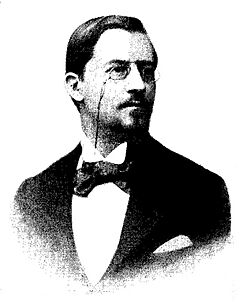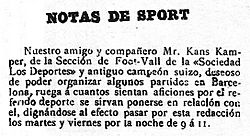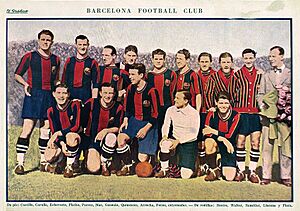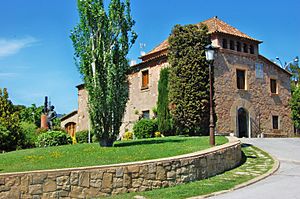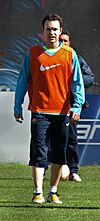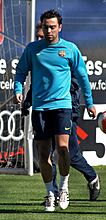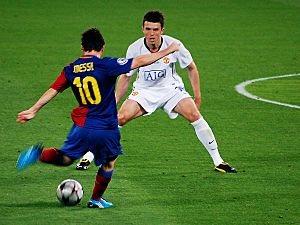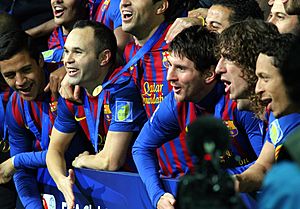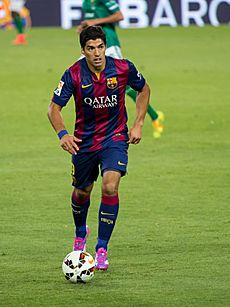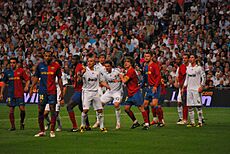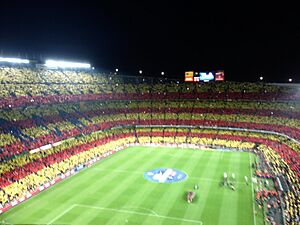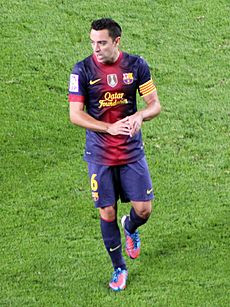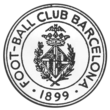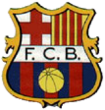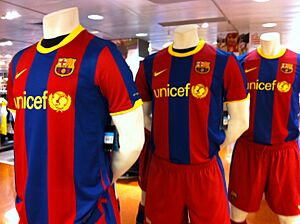FC Barcelona facts for kids
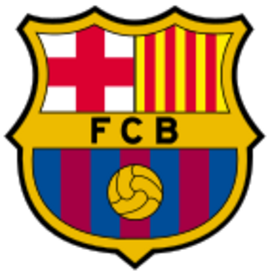 |
||
| Full name | Futbol Club Barcelona | |
|---|---|---|
| Nickname(s) | Barça or Blaugrana (team) Culers or Barcelonistes (supporters) Blaugranes or Azulgranas (supporters) |
|
| Founded | 29 November 1899 (as Foot-Ball Club Barcelona) | |
| Stadium | Estadi Olímpic Lluís Companys | |
| Capacity | 54,367 | |
| Coordinates | 41°21′53.0″N 2°09′20.3″E / 41.364722°N 2.155639°E | |
| President | Joan Laporta | |
| Manager | Hansi Flick | |
| League | La Liga | |
| 2022–23 | La Liga, 1st of 20 (champions) | |
|
|
||
Futbol Club Barcelona, often called FC Barcelona or simply Barça, is a professional football club from Barcelona, Catalonia, Spain. They play in La Liga, which is the top football league in Spain.
The club was started in 1899 by Joan Gamper and a group of Swiss, Catalan, German, and English footballers. Barcelona quickly became a symbol of Catalan culture, using the motto "Més que un club" ("More than a club"). This means the club is more than just a sports team; it represents the spirit of Catalonia. Unlike many other clubs, Barcelona is owned and run by its supporters. It is one of the richest and most valuable football clubs in the world. The club's official song is "Cant del Barça". Barcelona's traditional colours are dark blue and garnet stripes, which is why they are nicknamed Blaugrana (blue and garnet).
Barcelona is one of the most successful clubs globally. In Spain, they have won a record 80 trophies. This includes 28 La Liga titles, 32 Copa del Rey titles, and 15 Supercopa de España titles. In international competitions, Barça has won 22 European and worldwide titles. These include five UEFA Champions League titles and three FIFA Club World Cups. Barcelona has often been ranked as one of the top clubs in the world. They have a big rivalry with Real Madrid, and their matches are called El Clásico.
Barcelona is one of the most popular teams in the world, with a huge following on social media. Many famous players have won awards while playing for Barcelona. These include Johan Cruyff, Romário, Ronaldo, Rivaldo, Ronaldinho, and Lionel Messi. In 2010, three players from the club's youth academy, La Masia—Lionel Messi, Andrés Iniesta, and Xavi—were chosen as the top three players in the world for the Ballon d'Or award. This was a first for players from the same youth academy.
Barcelona is one of only three founding members of La Liga that have never been relegated from the top division since it began in 1929. In 2009, Barcelona became the first Spanish club to win the continental treble. This means they won La Liga, the Copa del Rey, and the UEFA Champions League all in one season. They also became the first European club to win six competitions in a single year. This amazing team, led by coach Pep Guardiola, won 14 trophies in just four years and is considered one of the greatest teams ever. In 2015, Barcelona won their fifth Champions League trophy, becoming the first European club to win the continental treble twice.
Contents
Club History
Early Years and Growth (1899–1922)
On October 22, 1899, Swiss footballer Joan Gamper placed an advertisement looking to form a football club. A meeting was held on November 29, and Foot-Ball Club Barcelona was officially formed by eleven players.
Barcelona quickly found success in regional and national cups. In 1902, they won their first trophy, the Copa Macaya. In 1908, Joan Gamper became club president to save Barcelona from financial trouble. He was president five times and helped the club get its own stadium, which provided a steady income.
On March 14, 1909, the team moved to the Camp de la Indústria, a stadium that could hold 8,000 people. The club held a contest for a new logo, and Carles Comamala won. His design is still used today with some small changes.
The new stadium helped the club grow. They won many titles, including three regional championships in a row and three Copa del Rey titles. They also won the Pyrenees Cup four times, which was an important international club competition at the time.
During this period, the club started using Catalan as its official language. It became an important symbol of Catalan identity. By 1922, the club had over 20,000 members, who helped fund a new stadium. The club then moved to Les Corts, which could hold 30,000 fans and later expanded to 60,000.
In 1912, Barcelona signed Paulino Alcántara, who became one of the club's top goal-scorers. In 1917, Jack Greenwell became Barcelona's first full-time coach. With players like Alcántara, Ricardo Zamora, and Josep Samitier, Barcelona entered its first "golden age." They won many regional titles and two Copa del Rey titles.
Challenges and Resilience (1923–1957)
In 1925, during a dictatorship, the crowd at the stadium booed the national anthem. As a result, the stadium was closed for six months, and Gamper had to leave his role as president. The club then became a professional football club.
In 1929, Barcelona won the first-ever Spanish League title. Sadly, a year later, Joan Gamper passed away. The club went through a tough period, with political problems in Spain affecting sports. Even though they won regional titles, they struggled nationally.
When the Spanish Civil War began in 1936, club president Josep Sunyol was killed by soldiers. He became known as a hero for barcelonisme (the spirit of Barcelona). In 1937, the team toured Mexico and the United States, which helped the club financially. However, many players stayed abroad, making it harder for the team to win trophies.
In 1938, Barcelona's offices were bombed during the war. After Catalonia was taken over, the club faced many restrictions. The Catalan flag was banned, and the club had to change its name to Club de Fútbol Barcelona. They also had to remove the Catalan flag from their crest.
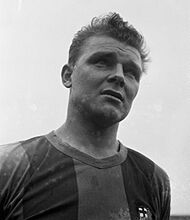
Despite these challenges, Barcelona had success in the 1940s and 1950s. In 1945, they won La Liga for the first time since 1929. They won two more titles in 1948 and 1949. In 1950, Barcelona signed László Kubala, a very important player for the club.
In 1951, during a tram strike in Barcelona, fans left the stadium on foot to support the strike. This showed that FC Barcelona was more than just a club; it represented the people's desire for rights and freedoms.
With coach Ferdinand Daučík and Kubala, the team won five different trophies in 1952, including La Liga and the Copa del Generalísimo. They won these two trophies again in 1953.
New Stadium and European Success (1957–1978)
The Camp Nou stadium was finished in 1957. This meant the club had less money for new players. In the 1960s, Real Madrid dominated La Liga. However, Barcelona won the Copa del Generalísimo in 1963 and the Fairs Cup in 1966. In 1968, Barcelona beat Real Madrid 1–0 in the Copa del Generalísimo final.
When the dictatorship ended in 1974, the club changed its name back to Futbol Club Barcelona. They also brought back the original crest with the Catalan flag.
Johan Cruyff joined Barcelona in the 1973–74 season for a world record fee. He quickly became a fan favorite. He said he chose Barcelona over Real Madrid because he didn't want to play for a club linked to the dictator. He even named his son "Jordi" after the Catalan patron saint. Cruyff helped the club win La Liga in 1974, their first title since 1960. He also won the European Footballer of the Year award three times while with Barcelona.
Modern Era and "Dream Team" (1978–2000)
In 1978, Josep Lluís Núñez became the first elected president of FC Barcelona. From then on, club members have voted for the president. Núñez wanted to make Barcelona a top club worldwide. He was president for 22 years.
The club won its first UEFA Cup Winners' Cup in 1979. That same year, Núñez started investing in the club's youth program, turning La Masia into a home for young academy players. This academy would become very important for the club's future success.
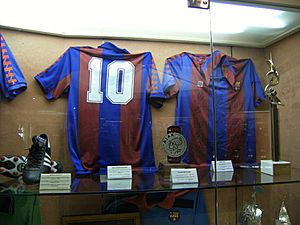
In 1982, Diego Maradona joined Barcelona for a world record fee. The team won the Copa del Rey in the next season. Maradona later left the club. In 1984–85, under manager Terry Venables, Barcelona won La Liga.
In 1988, Johan Cruyff returned to the club as manager. He built what became known as the "Dream Team." This team included Spanish players like Pep Guardiola and international stars like Ronald Koeman, Michael Laudrup, and Romário.
Players from the La Masia youth academy, like Pep Guardiola, started playing for the first team. Under Cruyff, Barcelona won four La Liga titles in a row from 1991 to 1994. They also won the 1992 European Cup (now the Champions League) at Wembley. Cruyff won 11 trophies as manager, making him the club's most successful manager at that time.
After Cruyff left, Bobby Robson managed the team for one season (1996–97). He signed Ronaldo and won three cup trophies. Then, Louis van Gaal became manager. With players like Luís Figo, Patrick Kluivert, and Rivaldo, the team won a Copa del Rey and La Liga double in 1998. In 1999, the club celebrated its 100th anniversary by winning the La Liga title.
New Leadership and Continued Success (2000–2012)
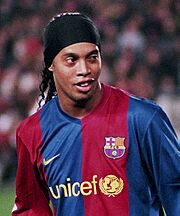
After the departure of president Núñez and manager Van Gaal, the club went through a difficult period. Fans were also upset when star player Luís Figo joined rivals Real Madrid.
In 2003, a new young president, Joan Laporta, and a new manager, Frank Rijkaard, brought the club back to success. They signed international players like Ronaldinho, Deco, and Samuel Eto'o. These players, along with home-grown talents like Carles Puyol, Andrés Iniesta, and Xavi, led to a return to winning ways. Barcelona won La Liga and the Supercopa de España in 2005.
In the 2005–06 season, Barcelona won the league and Supercopa again. They also won the Champions League final against Arsenal, their first European Cup in 14 years.
After a couple of trophyless seasons, Joan Laporta announced that Barcelona B coach Pep Guardiola would take over as manager in 2008.
The Guardiola Era (2008–2012)
Pep Guardiola became the new manager and brought his famous tiki-taka style of play. He built the team around Xavi, Andrés Iniesta, and Lionel Messi.
In 2009, Barça won the Copa del Rey, La Liga, and the Champions League, completing the first-ever treble for a Spanish team. They then went on to win the Spanish Super Cup, UEFA Super Cup, and the FIFA Club World Cup, becoming the first European club to win six trophies in a single year.
In 2010, Barcelona won La Liga again. At the 2010 FIFA Ballon d'Or ceremony, Messi, Iniesta, and Xavi, all from Barcelona's La Masia academy, were named the three best players in the world. This was a historic moment for a youth academy.
In the 2010–11 season, Barcelona won La Liga for the third time in a row. In May 2011, they defeated Manchester United in the Champions League Final to win their fourth European Cup. They also won the Spanish Supercup and the UEFA Super Cup.
In December 2011, Barcelona won the Club World Cup for a record second time. This brought Guardiola's trophy count to 13 out of a possible 16. Many people consider this Barcelona team to be the greatest of all time.
Guardiola left the club in 2012, after winning the Copa del Rey, bringing his total to 14 trophies. His assistant, Tito Vilanova, took over as manager.
Recent Years and Post-Messi Era (2012–Present)
Under Tito Vilanova, Barcelona had an amazing season in 2012–13, winning La Liga with 100 points. Lionel Messi was again their top scorer. Sadly, Vilanova had to resign in 2013 due to health reasons.
Gerardo Martino became manager for the 2013–14 season. In 2014, Josep Maria Bartomeu became president.
In the 2014–15 season, Barcelona won the treble again: La Liga, Copa del Rey, and Champions League. This made them the first European team to win the treble twice. The attacking trio of Messi, Luis Suárez, and Neymar, known as "MSN," scored a record 122 goals that season.
In 2015, Barcelona won the European Super Cup and the Club World Cup for a record third time. They set a new record for most goals scored in a calendar year with 180 goals. In 2016, Barcelona broke the club record for consecutive games unbeaten, reaching 39 matches. They won their sixth La Liga title in eight seasons.
In 2017, Barcelona made a historic comeback in the Champions League, winning 6–1 against Paris Saint-Germain after losing the first leg 4–0. Ernesto Valverde became the new manager. In 2018, Barcelona set the longest unbeaten streak in La Liga history with 43 games. They won their 26th La Liga title in 2019.
In 2020, Quique Setién and then Ronald Koeman managed the team. Josep Maria Bartomeu resigned as president.
On March 7, 2021, Joan Laporta was elected president again. Barcelona won their 31st Copa del Rey, their only trophy under Ronald Koeman. In August 2021, Barcelona faced financial difficulties and could not re-sign Lionel Messi, who left the club after 21 years. Club legend Xavi took over as manager in October 2021.
On January 15, 2023, Xavi led Barcelona to win the Supercopa de España, their first trophy since 2021. On May 14, 2023, Barcelona won their 27th league title, their first in the post-Messi era.
Club Supporters
About 25% of people in Spain support Barça, making them the second most supported team after Real Madrid. Barcelona is also a popular second-choice club across Europe. The number of club members, called socis, has grown a lot over the years. As of May 31, 2023, the club has 150,317 members.
There are also over 1,200 official fan clubs, called penyes, around the world. These fan clubs help promote Barcelona in their local areas. Barcelona has one of the largest social media followings among sports teams globally. Many famous people, including Pope John Paul II, have been supporters of the club.
Club Rivalries
El Clásico
The match between Barcelona and Real Madrid is known as "The Classic" (El Clásico). This is one of the most intense rivalries in football. It represents the historical tensions between Catalonia and Castile, as well as the two cities.
Since the 1930s, Barcelona has been seen as a symbol of Catalan identity, standing against the central government in Madrid. During the dictatorships in Spain, all regional languages and identities were suppressed. Because of this, Barcelona gained its motto Més que un club (More than a club), showing its connection to Catalan identity and progressive ideas.
There is debate about how much the dictatorship affected both clubs. Most historians agree that the dictator did not have a favorite team at first. However, he later realized the importance of Real Madrid for Spain's international image, and the club became his preferred team.
The rivalry became even stronger in the 1950s when both clubs wanted to sign Alfredo Di Stéfano. Barcelona had an agreement with his former club, but Di Stéfano ended up signing with Real Madrid. He became a key player in Real Madrid's success, helping them win the first five European Cups.
Matches between the two teams are known for their intensity and memorable moments. In 2009, Barcelona captain Carles Puyol kissed his Catalan armband in front of Real Madrid fans. In 2017, Lionel Messi celebrated a winning goal by holding up his Barcelona shirt to the Real Madrid fans.
El derbi Barceloní
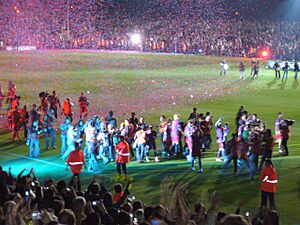
Barça's local rival is Espanyol. Espanyol was founded by Spanish football fans, unlike Barcelona, which had a more international start. Espanyol was seen by some as representing the central authority, while Barça represented a more independent spirit.
Despite these differences, the derby has always been more important to Espanyol fans than to Barcelona fans, mainly because of the difference in their goals. In recent years, the rivalry has become less political.
Barcelona has been much more dominant in this derby. Espanyol has only finished above Barça in the league table three times in 87 seasons. Barcelona has also won the only all-Catalan Copa del Rey final in 1957.
Rivalry with AC Milan
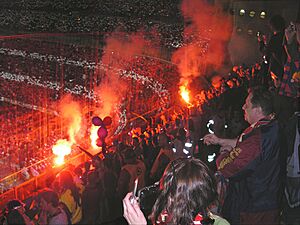
One of Barcelona's rivals in European football is the Italian club AC Milan. They have played each other many times in European competitions. Both clubs are very successful in Europe. Milan has won seven European Cups, and Barça has won five. Both clubs have also won a record five European Super Cups.
Barcelona has won more matches against Milan overall. While Milan has never knocked Barcelona out of the European Cup, they did beat Johan Cruyff's "Dream Team" 4–0 in the 1994 Champions League final. However, in 2013, Barcelona made a great comeback against Milan, winning 4–0 at Camp Nou after losing the first leg 2–0.
Club Ownership and Finances
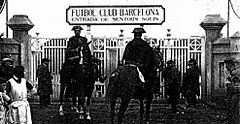
Like a few other Spanish clubs, Barcelona is a registered association. This means you cannot buy shares in the club. Instead, it is owned by its members, called socis. The members form a group that is the highest governing body of the club. As of May 31, 2023, the club has 150,317 members.
In 2010, Forbes magazine estimated Barcelona's value to be around €752 million (about $1 billion). By 2014, they were ranked the second most valuable sports team in the world, worth $3.2 billion. In 2018, Barcelona became the first sports team to earn over $1 billion in revenue in a single year. However, due to high spending and the COVID-19 pandemic, the club's debt increased significantly by 2021.
On November 9, 2024, Barcelona announced a new sponsorship deal with Nike, which is said to be the biggest in football history.
Club Records
Lionel Messi holds the record for the most official appearances for Barcelona, with 778 games. He also holds the record for most appearances in La Liga matches for the club, with 520.
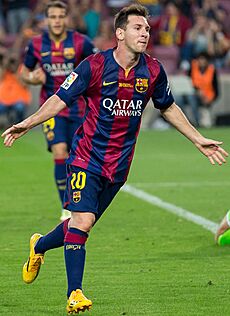
Messi is Barcelona's all-time highest goalscorer in official competitions, with 672 goals. He also holds the record for the most goals scored for a single club, surpassing Pelé's record. Messi is the top scorer for Barcelona in European and international club competitions, and the top league scorer with 474 goals in La Liga. Other players who have scored over 100 league goals for Barcelona include César Rodríguez, Luis Suárez, László Kubala, and Samuel Eto'o.
László Kubala holds the La Liga record for most goals in one match, scoring seven goals in 1952. Lionel Messi shares the Champions League record with five goals in a single game in 2012.
Barcelona goalkeepers have won the Ricardo Zamora Trophy (for best goalkeeper) a record 20 times. Antoni Ramallets and Víctor Valdés each won it five times. Valdés also holds the record for the longest time without letting in a goal for Barcelona (896 minutes).
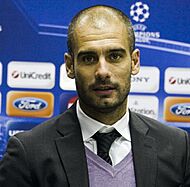
Jack Greenwell is Barcelona's longest-serving manager, coaching for nine years. Pep Guardiola is the club's most successful manager, winning 14 trophies in four years. The most successful Barcelona player is Lionel Messi, with 35 trophies.
Barcelona's Camp Nou is the largest stadium in Europe. Its highest attendance was 120,000 in 1986. The stadium's current capacity is 99,354.
Barcelona was the first Spanish team to win five trophies in a single season (1951–52). In 2009, Barcelona became the first European football team to win six trophies in a calendar year. In 2017, Neymar transferred from Barcelona to Paris Saint-Germain for a world record fee of €222 million.
In 2016, Barcelona's La Masia academy was ranked as one of the best in the world for producing top-level players.
Club Kits and Crest
The club's first crest was a diamond shape with the Crown of Aragon and a bat on top. It looked like the city's coat of arms. In 1910, a competition was held for a new crest. Carles Comamala, a player, won the contest. His design is still used today with small changes. The crest has the St George's Cross and the Catalan flag at the top, with the team colours at the bottom.
The blue and garnet colours of the shirt were first worn in 1900. There are different ideas about why these colours were chosen. One idea is that they came from the colours of Joan Gamper's home team, FC Basel.
|
|
|
|
|
- Notes
Kit Suppliers and Sponsors
Since 1998, Nike has been Barcelona's kit supplier. In 2016, they renewed their deal until 2028. Barcelona earns a lot of money from selling kits and merchandise.
For a long time, Barcelona did not have a sponsor name on the front of their shirts. In 2006, they signed an agreement to put UNICEF's name on their shirts. This was special because the club raised money for UNICEF instead of getting paid. In 2011, the club signed its first commercial shirt sponsorship deal with Qatar Foundation.
| Period | Kit manufacturer | Shirt main sponsor | Shirt sub sponsor(s) |
|---|---|---|---|
| 1899–1982 | None | None | None |
| 1982–1992 | Meyba | ||
| 1992–1998 | Kappa | ||
| 1998–2003 | Nike | ||
| 2003–2004 | Forum (left sleeve) | ||
| 2004–2006 | TV3 (left sleeve) | ||
| 2006–2011 | UNICEF | ||
| 2011–2013 | Qatar Foundation | TV3 (left sleeve) & UNICEF (back shirt) | |
| 2013–2014 | Qatar Airways (€33,5m/year) |
UNICEF (back shirt) | |
| 2014–2017 | Beko (left sleeve) & UNICEF (back shirt) | ||
| 2017–2021 | Rakuten (€55m/year) |
||
| 2021–2022 | UNICEF (back shirt) | ||
| 2022–2023 | Spotify | UNHCR (back shirt) | |
| 2023– | AMBILIGHT TV (left sleeve) & UNHCR (back shirt) |
Club Anthems
The club has had several official songs throughout its history. The current anthem is "Cant del Barça" (The Song of Barça). It was created in 1974 for the club's 75th anniversary. The lyrics were written by Josep Maria Espinàs and Jaume Picas, and the music was composed by Manuel Valls.
The song was first performed on November 27, 1974, at Camp Nou. Since the 2008–09 season, "Cant del Barça" has been featured on the official Barcelona jerseys.
For the club's 124th anniversary, a new version of the anthem was recorded. It keeps the original music and lyrics but has better sound quality and more instruments and voices. This new version is performed by the Vallès Symphony Orchestra, the Orfeó Català choir, and the Cor Jove youth choir.
"Cant del Barça" is played before Barcelona games at Camp Nou, especially during matches against Real Madrid. It is also often played for fans to cheer and celebrate victories.
Club Stadium
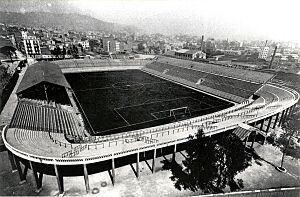
Barcelona first played on different fields. One of their first fixed homes was the Camp de la Indústria, which could hold about 6,000 people. This was not big enough for the growing number of club members.
In 1922, with over 20,000 supporters, Barça built the larger Les Corts stadium. It started with a capacity of 20,000 and was later expanded to 60,000.
After the expansions, there was no more room to grow at Les Corts. The club's success and the signing of László Kubala in 1950 brought even larger crowds. So, the club started planning a new stadium. Construction of the Camp Nou began on March 28, 1954. It took three years to build and opened on September 24, 1957.
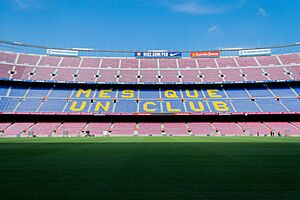
In 1980, to raise money for stadium improvements, the club let supporters engrave their names on bricks for a small fee. This was very popular. Camp Nou was also updated for the 1992 Summer Olympics. It now has a capacity of 99,354, making it the largest stadium in Europe.
In December 2021, club members voted to approve the Espai Barça project to renovate the club's sports facilities. Renovation work on Camp Nou began on June 1, 2023. It is expected to be finished by the end of 2026. During the renovation, Barcelona will play their home games at the Estadi Olímpic Lluís Companys in Montjuïc for the entire 2023–24 season. They expect to return to Camp Nou in November 2024, even though the stadium will still be under construction.
Other facilities include:
- Ciutat Esportiva Joan Gamper (Barcelona's training ground)
- Masia-Centre de Formació Oriol Tort (Home for young players)
- Estadi Johan Cruyff (Home for the reserve team, women's team, and youth team)
- Palau Blaugrana (Barcelona's indoor sports arena)
Club Honours
| Type | Competition | Titles | Seasons |
|---|---|---|---|
| Domestic | La Liga | 28 | 1929, 1944–45, 1947–48, 1948–49, 1951–52, 1952–53, 1958–59, 1959–60, 1973–74, 1984–85, 1990–91, 1991–92, 1992–93, 1993–94, 1997–98, 1998–99, 2004–05, 2005–06, 2008–09, 2009–10, 2010–11, 2012–13, 2014–15, 2015–16, 2017–18, 2018–19, 2022–23, 2024–25 |
| Copa del Rey | 32 | 1910, 1912, 1913, 1920, 1922, 1925, 1926, 1928, 1942, 1951, 1952, 1952–53, 1957, 1958–59, 1962–63, 1967–68, 1970–71, 1977–78, 1980–81, 1982–83, 1987–88, 1989–90, 1996–97, 1997–98, 2008–09, 2011–12, 2014–15, 2015–16, 2016–17, 2017–18, 2020–21, 2024–25 | |
| Copa de la Liga | 2 | 1983, 1986 | |
| Supercopa de España | 15 | 1983, 1991, 1992, 1994, 1996, 2005, 2006, 2009, 2010, 2011, 2013, 2016, 2018, 2023, 2025 | |
| Copa Eva Duarte | 3 | 1948, 1952, 1953 | |
| Continental | UEFA Champions League | 5 | 1991–92, 2005–06, 2008–09, 2010–11, 2014–15 |
| UEFA Cup Winners' Cup | 4 | 1978–79, 1981–82, 1988–89, 1996–97 | |
| UEFA Super Cup | 5 | 1992, 1997, 2009, 2011, 2015 | |
| Inter-Cities Fairs Cup | 3 | 1955–58, 1958–60, 1965–66 | |
| Latin Cup | 2S | 1949, 1952 | |
| Worldwide | FIFA Club World Cup | 3 | 2009, 2011, 2015 |
| Regional | Catalan football championship | 23 | 1901–02, 1902–03, 1904–05, 1908–09, 1909–10, 1910–11, 1912–13, 1915–16, 1918–19, 1919–20, 1920–21, 1921–22, 1923–24, 1924–25, 1925–26, 1926–27, 1927–28, 1929–30, 1930–31, 1931–32, 1933–34, 1935–36, 1937–38 |
- Record
- S Shared record
Current Players
|
|
Players on Loan
|
Club Management
Technical Staff
| Position | Staff |
|---|---|
| Head coach | |
| Assistant coaches | |
| Goalkeeping coach | |
| Head of fitness training | |
| Field fitness coach | |
| Gym and strength fitness coach | |
| Rehab coach | |
| Analysts | |
| Video analyst | |
| Match analyst | |
| Physiotherapists | |
| Club doctors | |
| Dietitians | |
| Delegate |
Last updated: 15 August 2024
Source: [1]
Football Sport Management
| Position | Staff |
|---|---|
| Director of Football | |
| Football Coordinator | |
| Director of Scouting | |
| Managerial Director | |
| Barça Atlètic Head Coach | |
| Youth Football General Manager | |
| Youth Football Coordinators | |
| Juvenil A (U19 A) coach | |
| Juvenil B (U19 B) coach | |
| Head of FUTBOL 11 | |
| Head of FUTBOL 7 | |
| Goalkeeping Coordinator from Cadet A (U12 A) to Prebenjamí (U10) |
Last updated: 16 August 2023
Source: FC Barcelona
Board of Directors
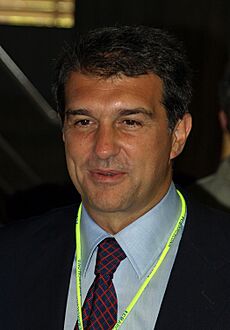
| Office | Name |
|---|---|
| President | Joan Laporta |
| First Vice President Director Responsible for Sporting Area Director of the Barça Foundation |
Rafael Yuste |
| Institutional Vice President | Elena Fort |
| Vice President Director Responsible for Social Area |
Antonio Escudero |
| Vice President Director Responsible for Marketing Area |
Juli Guiu |
| Treasurer | Ferran Olivé |
| Secretary Director Responsible for Basketball |
Josep Cubells |
| Director Assistant to the Delegate Counsellor | Josep Maria Albert |
| Director Responsible for Rink Hockey | Xavier Barbany |
| Director Responsible for Security | Alfons Castro |
| Director Responsible for Social Area | Josep Ignasi Macià |
| Director Responsible for Futsal | Aureli Mas |
| Director Responsible for Women's Football | Xavier Puig |
| Director Responsible for Handball | Joan Solé |
| Director Responsible for Youth Football | Joan Soler |
| Board members | Miquel Camps Àngel Riudalbas |
| President of Barça Atlètic | Jordi Casals |
Last updated: 27 March 2024
Source: FC Barcelona
See also
 In Spanish: Fútbol Club Barcelona para niños
In Spanish: Fútbol Club Barcelona para niños
- List of fan-owned sports teams
- Barcelona Femení
- Barcelona Atlètic
- Barcelona Futsal
- Barcelona Bàsquet
- Barcelona Handbol
- List of world champion football clubs
 | Roy Wilkins |
 | John Lewis |
 | Linda Carol Brown |


